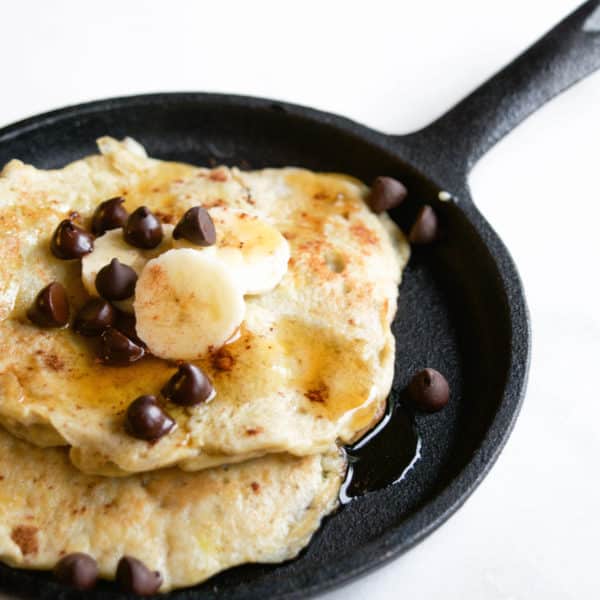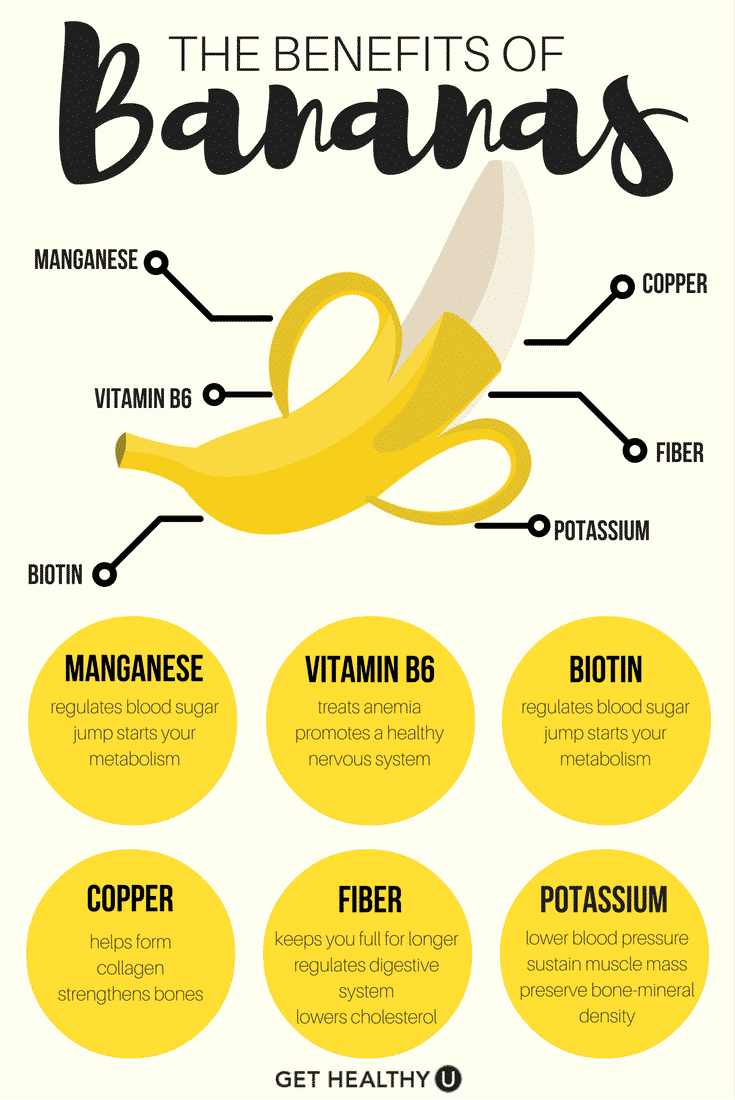The bashing of bananas has received a lot of attention with articles such as “eating bananas causes weight gain” to “Stop eating bananas for a flatter stomach.” Just when you thought fruit was safe, you’re now being told one of nature’s natural candies can be a threat to your weight. Whoa!
Let me start by saying that I, a certified fitness expert, eat a banana every day. If bananas made you fat, I’d be the poster child. Bananas are not the reason you are gaining weight and I think everybody knows what causes weight gain. (Yes, it’s processed food and excess calories.)
So how did this simplistic fruit, grown from the earth and unprocessed, get such a bad rap in recent years? And are bananas evil? Or are bananas actually good for weight loss?
Bananas Won’t Make You Gain Weight Because It’s Not A Processed Sugar
The more processed a food is, the more nutrients it loses due to ridding the food of its natural state. Nutrients such as vitamins and minerals are essential for helping the body function on a day-to-day basis.
So why would an unprocessed, wholesome food such as a banana be considered “bad for you?” It started with people confusing the fact that excess sugar is bad for you and screws up your insulin, and blood sugar.
Many fitness influencers started telling clients to avoid sugar at all costs. However their logic is flawed. They should have been talking about added sugars. Added sugar is the culprit and seems to be in most processed foods. Natural sugar that occurs in fruits and vegetables is not the problem.
There is a big difference between processed sugars and natural sugar.
Processed Sugar Vs. Natural Occuring Sugar
I’m happy to shed light on why natural sugars found in fruits like bananas differ from processed sugars and why it’s absolutely okay to include any fruit in a balanced diet.
Nutrient Density
Fruits are not just a source of sugar; they come packed with essential nutrients such as vitamins, minerals, fiber, and antioxidants. These nutrients play crucial roles in supporting overall health, immune function, and disease prevention.
Processed sugars, on the other hand, lack any essential nutrients or value and are often referred to as “empty calories.”
By the way, the daily recommended allowance for added sugars is 24 grams or less. You do not need to include natural sugars in this amount only added sugars from processed foods.
Fiber Content
Fruits contain dietary fiber, which slows down the absorption of sugar and helps regulate blood sugar levels. Fiber also promotes satiety, making you feel fuller for longer, which can aid in weight management.
Processed sugars, like those found in candies, cookies, chips or sugary beverages, lack this fiber, causing a quicker spike in blood sugar levels.
Phytonutrients and Antioxidants
Fruits are rich in phytonutrients and antioxidants that have various health benefits, including reducing inflammation and protecting cells from damage. These compounds are generally absent in processed sugars, which have been stripped of natural components during refining.
Slow Energy Release
The natural sugars in fruits are accompanied by other macronutrients like fiber, which slows down the digestion and absorption of sugars. This gradual release of energy helps maintain steady blood sugar levels, providing a sustained source of energy.
In contrast, processed sugars can lead to rapid spikes and crashes in blood sugar, contributing to feelings of fatigue and cravings.
Gut Health
The fiber in fruits also plays a crucial role in promoting a healthy gut microbiome. A balanced and diverse gut microbiota has been linked to various health benefits, including improved digestion and immune function.
Portion Control and Whole Food Approach
Fruits come in their natural packaging, and it’s relatively easy to consume them in appropriate portions. On the other hand, processed sugars often hide in various foods, making it easier to consume excessive amounts without realizing it. (If you’ve ever eaten a whole sleeve of Girl Scout cookies then you know what I mean!)
Health Benefits Of A Banana
Aa already explained fruit is truly nutrient rich. Bananas in particular contain potassium, fiber, vitamin B6, biotin, copper, and manganese.
Fiber
The fiber in a banana is naturally occurring fiber, which means you’ll most likely feel more full and satisfied versus consuming a cereal or granola bar containing isolated fiber.
Isolated fibers are those added to increase their fiber content but are not naturally found in the foods. Some examples you’ll see on a processed food label are inulin, maltodextrin, and polydextrose.
Potassium
The potassium in a typical medium banana fulfills around 10 percent of the daily recommended intake for adults. Potassium has been shown to lower blood pressure, sustain muscle mass, regulate your body’s salt intake and preserve bone mineral density.
Vitamin B
The vitamin B6 in a banana fulfills around 30-35 percent of the daily recommended intake for adults.
The benefits of vitamin B include treating anemia, promoting healthy nervous system functioning, producing energy from food, and maintaining healthy skin, eyes, hair, and liver.
Vitamin B6 is found in most animal-based products, so for vegetarians and vegans, consuming a banana a day is a great way to attain almost half of the recommended intake.
Manganese
Manganese regulars blood sugar which jumpstart your metabolism. It’s also good for your skin and produces collagen.
Clearly, the nutrients in bananas can nourish your body more than a processed food product.
Can You Overeat Bananas?
The only thing you need to be aware of is if you’re consuming bananas like a chimpanzee (you consume a large quantity of them daily!) then yes, you will need to be concerned about weight gain. However this goes for any food: if you consume any food in large quantities, you’re more likely going to consume more calories than you burn and possibly gain weight from that.
Eating in moderation is always the key to a healthy diet! If you choose to consume bananas daily, a general guideline is to consume no more than two per day.
Are Bananas Good For Weight Loss?
Consuming one banana a day is a great addition to a healthy weight loss plan. In addition to all the nutrients mentioned above, bananas are full of fiber that fiber is what helps keep you full for longer.
Studies have shown that eating a diet high in fiber can help with weight loss by up to 30%.
Delicious Ways to Incorporate Bananas Into Your Diet
Bananas As A Topping
Slice bananas and add them on top of cereal, yogurt, smoothies, oatmeal, etc.
Banana Nice Cream
Peel ripe bananas and freeze them in a plastic bag. Thaw them for an easy homemade banana ice cream using frozen bananas and a food processor.
Bananas In Baked Goods
Substitute for oil in baked goods Use ripe bananas for delicious banana bread
[ghuvideo slug="chocolate-chip-banana-bread-peanut-butter-drizzle"]Bananas In Smoothies
Incorporate them into one of our yummy and satisfying smoothie recipes.
Banana Pancakes
Try these delicious two-ingredient pancakes.


12 Comments
Ange on June 17, 2018 at 8:54 AM
I did wonder about this asi have been eating a banana a day recently and have gained body fat. I have even cut down on other food intake too. I think I may have to find a banana substitute.
jayjay on June 14, 2018 at 6:52 AM
can i ask i eat banana 6 times a day and can i make gain weight with that?? because i subtitute banana for rice
Chris Freytag on June 25, 2018 at 1:50 PM
Hi there - any food in large quantities, like 6 bananas a day, can add to a higher calorie intake and thus weight gain. So, yes, in this case it's possible to gain weight just from the higher calorie intake.
Add on May 22, 2018 at 4:12 PM
It’s not as easy as saying no bananas don’t make you fat. It depends how your body reacts to them and how they are processed. I’ve tracked my weight and blood sugar eating bananas and not eating bananas and I can tell you with confidence they spike my blood sugar and they cause me to gain weight, when I cut them out I lose it again.
joe on October 10, 2017 at 9:28 AM
banana, unsw almond milk, blend, too good to be true
Anne on July 9, 2017 at 8:34 AM
So bananas won't make you gain weight right?
Chris Freytag on July 10, 2017 at 8:30 AM
Right! If you add 10 bananas a day to your diet, you might, but no one is going to do that, and it doesn't have anything to do with the banana, just the amount!
Ursula on April 17, 2016 at 7:32 PM
Thanks for that interesting article. I have a mind of my own. The bananas stay!
Nicole on April 17, 2016 at 7:18 PM
Thx for the truth about a fruit I love!
Alan Pratt on March 1, 2016 at 7:13 AM
Banana good 4 ya
Ben on February 23, 2016 at 10:44 AM
I like nanners!
Kim on January 16, 2016 at 8:55 PM
The isolated fibers you mentioned are straight up Sugar. Don't disguise them as fiber like the money grubbing industries do.